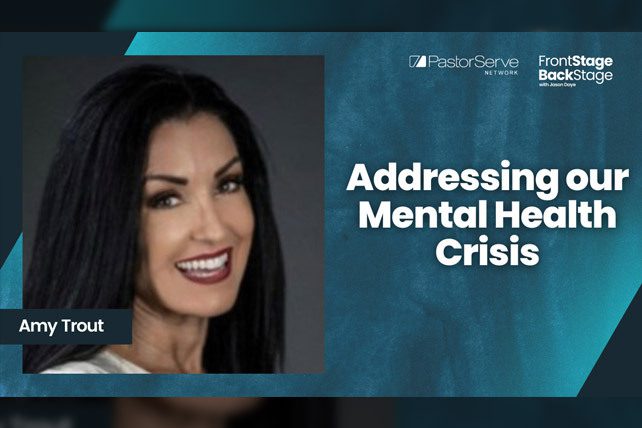FINLEYVILLE, Pennsylvania (RNS) — At first, the Rev. Ken Barner thought it was the sound system.
Tucked in a back room just behind the sanctuary of Crossroads Ministries, Barner was preparing to enter the stage for the evening service on Saturday (May 11), when he heard what sounded like a freight train. Then the lights flickered and Barner realized the noise was coming from outside.
“I’m thinking, we’re gonna lose this building,” said Barner in an interview on the steps of the church Monday morning.
RELATED: ‘Hallelujah Territory’—Oklahoma Baptist University Sustains Severe Tornado Damage But No Injuries
His wife Rhonda was singing “The God Who Stays,” a contemporary Christian hit by Matthew West, when Barner and other church leaders snapped into action, ushering the nearly 100 congregants down the stairs to the basement. Luke McClain, pastor of ministry development, was hit with shards of glass as two sanctuary windows blew out, but no one was seriously injured.

A tornado pulled the roof off a section of Crossroads Ministries Church in Finleyville, Penn., on Saturday evening, May 11, 2024. (Photo courtesy Crossroads Ministries)
It wasn’t until the group emerged from the basement roughly 30 minutes later that they discovered a tornado had blown off their church’s steeple, flinging it into the parking lot where it had smashed several cars.
Located just off a main road in Finleyville, a suburb of Pittsburgh, Crossroads Ministries is a nondenominational Protestant church that meets in a brick building built in 1972. It typically draws between 500-600 people across its three weekend services, according to the pastors. On Saturday, infants, 90-somethings and a few first-time visitors were all part of the roughly 100 people in attendance.
“It’s a true cross-section of Pittsburgh,” said Barner, who has been on staff since 1990 and became senior pastor in 2015. “We’re Yinzers. It’s Steeler country here.”
The pastor said there was no warning that the church was in the path of a tornado — while he was aware of storms predicted to land farther north, in Finleyville, sports games, birthday parties and church events went on as usual, Barner said, until the storm blew through.
“The job of the pastor is to lead, feed, guide and protect his congregation. And at times, we have to do that physically,” said Barner. “All I could think about was, let’s get everybody to safety.”
Hunkered in the basement hallway, Barner led the congregants in prayer and quoted Psalm 46 as they waited for the storm to pass. “The Lord is our refuge and strength, a very present help in times of trouble,” he recounted to RNS.
Soon, personnel from emergency medical services and the local fire department were on the scene. Fearing that the entire building would collapse, they led congregants into the adjacent building, which holds the school’s gymnasium, to assess potential injuries. Aside from minor bruises and cuts, everyone was unscathed.














 How can your local church help effectively address mental health issues in your community? In this week’s conversation on FrontStage BackStage, host Jason Daye is joined by Dr. Amy Trout. Amy is a psychologist who’s the founder and director of a private practice, Cornerstone Consultants. She also serves as the chief education officer at Counterpoise. She’s the co-author of a new book titled “Beyond the Clinical Hour.” Together, Amy and Jason look at the breadth of the current mental health crisis. Amy also shares some creative ways that the local church can partner with professional counselors to help address the mental health issues in your local community.
How can your local church help effectively address mental health issues in your community? In this week’s conversation on FrontStage BackStage, host Jason Daye is joined by Dr. Amy Trout. Amy is a psychologist who’s the founder and director of a private practice, Cornerstone Consultants. She also serves as the chief education officer at Counterpoise. She’s the co-author of a new book titled “Beyond the Clinical Hour.” Together, Amy and Jason look at the breadth of the current mental health crisis. Amy also shares some creative ways that the local church can partner with professional counselors to help address the mental health issues in your local community.











